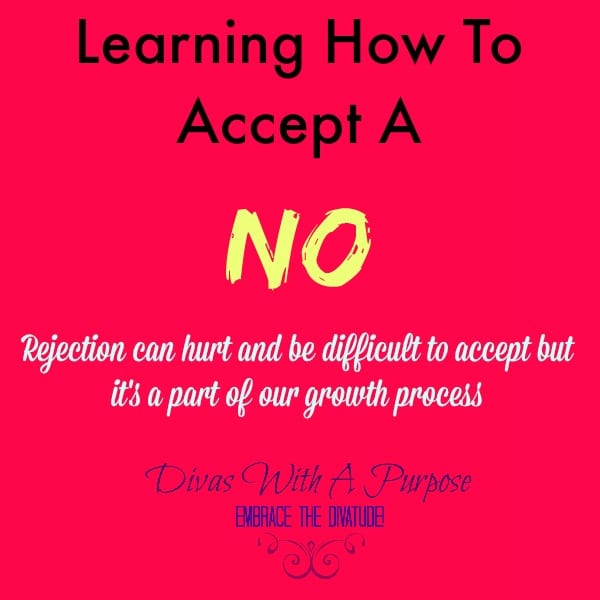Learning How To Accept A No
Welcome to Day 23 of our 31 Days of Embracing Your Divatude Challenge! Today we discuss how to accept a no.
If you are new to the challenge, you can catch up here.
Briefly, the month of May is dedicated to focusing on our Divatude – being driven, inspiring, victorious and called to action in our personal and professional lives. As women, different aspects of divatude impact our daily walk at all times. Our focus with this challenge is taking the time to reflect on our daily attitudes and actions and ensuring we are focusing on what will lift us and others around us up.

A reader asked a very interesting question after reading yesterday’s post on learning how to say no and one that I have heard numerous times before:
What if you are on the receiving end of the “No” and it is from your spouse, a close friend, or a relative and your request is something very important to you. How do you deal with the tough emotions of being hurt, or refrain from lashing back and creating an argument?
Being told no – especially in regards to something that is very important to us is not an easy pill to swallow. We need to evaluate where the no is coming from. If it’s coming from a place of malice and ill-intentions – that is an entirely different issue to deal with. However, if it is a sincere no because the person is unable or unwilling to support you based on their personal reasons (beliefs, time, buy-in, etc) than we should be able to respect that decision and move forward. If we are truly in need of assistance or support, than it is time to evaluate who we have that can support us in the way we need or how to garner the support system needed.

When told “No” there are few things we should be able to do:
Accept It
Recognize that it is impossible for everyone to say “yes” to everything. Thus, rejection is an expected byproduct of making an offer or asking for something.
Be Gracious
Always thank the other person for a rejection. Congratulate them. And be polite. This makes it easier for them to explain why they rejected your offer and it leaves them feeling that you are a good person.
On the other hand, using insults, guilt, anger, or other high pressure techniques will upset the person. That solidifies the rejection and ruins any further dialogue.
Always respect the other person’s decision.
Stop When It’s Over
Stop trying when it is clear that the conversation is over. Nobody likes to be badgered or hounded after they have made a choice.
Notice that accepting rejection involves treating the other person with respect and dignity.
Today’s challenge is to focus on learning how to accept a no. Reflect on a recent time you have been told no and how you felt and reacted. Did you give up or have you investigated other ways to move forward.
